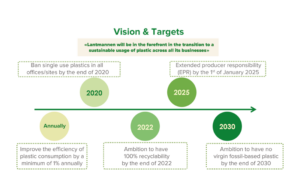Lantmännen is an agricultural cooperative and Northern Europe’s leader in agriculture, machinery, bioenergy and food products. Lantmännen is owned by 20,000 farmers and with grain at the heart of our operations, we refine arable land resources to make farming thrive. Here in Ukraine we belong to the food sector of Lantmännen. Everything we do when it comes to responsibility helps minimize risks and build trustable business. The new Lantmännen Plastic Strategy aims to reduce the usage of unnecessary plastics, create circular loops and get rid of single-use plastics.
Lantmännen wants to take a stance regarding responsible plastic consumption. Therefore, a project group was put together to develop a plastic strategy. The ultimate goal of the strategy is that Lantmännen takes responsibility for its plastic consumption, and is in the forefront of the transition to recycled and/or fossil-free plastic sources.
The strategy consists of a plastic vision and five key targets:
 ● The annual target of improving the efficiency of our plastic consumption by 1% could be done by decreasing thickness and size, replacing a package with another material to optimise the plastic consumption and costs per sold unit.
● The annual target of improving the efficiency of our plastic consumption by 1% could be done by decreasing thickness and size, replacing a package with another material to optimise the plastic consumption and costs per sold unit.
● By removing all single-use plastics, we set an example and we signal that we take the issue seriously by replacing it with sustainable alternatives. Instead of following EU-legislation that requires everybody to stop using single-use plastics by 2021, we have decided to be in the forefront by stopping a year earlier.
● In order to create circular streams in the plastics industry, we must ensure that all packaging and other plastics are recyclable. The recyclability makes sure that the plastics can be used several times, instead getting burned or dumped after being used once.
● By 2025, the EU will require that all producers must take responsibility for their packaging post-consumption, meaning that we must have clear schemes and plans for each and every type of our packaging. The EU has promised to share further details on this regulation in the years to come.
● To become fossil-fuel independent, we need to stop using virgin fossil-based plastics, and instead turn toward recycled or renewable sources to create new plastics.
In Ukraine, Lantmännen Cerealia has already rejected plastic single use cutlery in the offices and production facilities and has changed them to reusable cutlery, such as glass, ceramic and iron where it’s applicable. Our aim is not only to exchange single use plastic for another single use material, but to find, where possible, solutions to use reusable materials to reduce any waste. In places where reusable cups were not possible to use, we’ve exchanged them for paper cups. Another step that we have taken is to transition to decomposable waste packages in offices and production facilities. But what we have faced up to today is just a small range of proposals on decomposable waste packages on the market. Thus, we are still striving to fully complete this step in our plastic removal strategy. Other steps on our road map to follow our plastic strategy are coming and we will do our best to find better solutions for sustainable business development, says Igor Chervak, country manager of Lantmännen Cerealia UA.

Lantmannen Cerealia 3 Pryvokzalna St., Boryspil, 08304, Kyiv region, Ukraine
